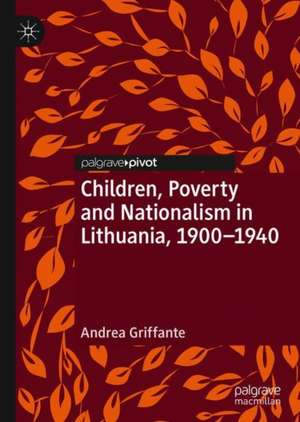Children, Poverty and Nationalism in Lithuania, 1900–1940
Autor Andrea Griffanteen Limba Engleză Hardback – 14 noi 2019
Preț: 418.07 lei
Nou
Puncte Express: 627
Preț estimativ în valută:
80.01€ • 86.88$ • 67.21£
80.01€ • 86.88$ • 67.21£
Carte tipărită la comandă
Livrare economică 23 aprilie-07 mai
Preluare comenzi: 021 569.72.76
Specificații
ISBN-13: 9783030308698
ISBN-10: 3030308693
Pagini: 148
Ilustrații: VII, 148 p.
Dimensiuni: 148 x 210 mm
Greutate: 0.34 kg
Ediția:1st ed. 2019
Editura: Springer International Publishing
Colecția Palgrave Pivot
Locul publicării:Cham, Switzerland
ISBN-10: 3030308693
Pagini: 148
Ilustrații: VII, 148 p.
Dimensiuni: 148 x 210 mm
Greutate: 0.34 kg
Ediția:1st ed. 2019
Editura: Springer International Publishing
Colecția Palgrave Pivot
Locul publicării:Cham, Switzerland
Cuprins
1. The Future of the Nation: The Emergence of Poor Children as a Problem.- 2. The Great War over Children, 1914–1918.- 3. Rehabilitating Children: Lithuania and International Humanitarian Aid, 1918-1923.- 4. The New Interwar Order: Children, Rehabilitation and Discipline, 1923-1940.- 5. Final Remarks.
Recenzii
“This book is a welcome addition to the history of childhood, nationalism, and charitable organizations. The text is separated into chapters tackling concise eras and offering a fresh comparison with other similar European movements. … this book is an important contribution to the history of childhood and youth in understanding and contextualizing both local and regional differences, but also showing how the rise in influence of political movements can affect the provision of aid to children in need.” (Aisling Shalvey, The Journal of the History of Childhood and Youth, Vol. 16 (3), 2023)
Notă biografică
Andrea Griffante is a Senior Research Fellow at the Lithuanian Institute of History, Vilnius. After graduating at the University of Trieste, he received his PhD in history from the University of Klaipėda, Lithuania.
Textul de pe ultima copertă
This book discusses the emergence of orphaned, abandoned and poor child care in Lithuania from the early 20th century to the beginning of World War II. In particular, it focuses on how poor child care practices were influenced by the nationalist and political discourse, and how orphanages became privileged institutions for nation building. Emerging during World War I and the early postwar humanitarian crisis, the Lithuanian orphaned and destitute children’s assistance network remained managed mainly by private actors. The field remained highly competitive. Until the early 1920s, concurrence had an eminently ethno-national character and the Lithuanian network was challenged by stronger Polish poor child assistance institutions. Nation-building goals did not prevent the emergence of political concurrence within separate ethno-national assistance networks. Even if political concurrence did not stop cooperation within the ethnic community, it did confirm the multiple character of nationalmobilization and consolidation processes in which otherness is by no means only ethnic in content.
Caracteristici
Discusses the emergence of care for orphaned, abandoned and poor children in Lithuania from the early twentieth century to the beginning of the Second World War Focuses on how such practices were influenced by competing nationalist and political discourses Explores how orphanages became privileged institutions for nation building
